In the late 1990s (aka “the tabloid era”), Stephen Glass, a rising young journalist for The New Republic, was exposed for writing fictitious news stories with fabricated information that had escaped the scrutiny of editors, as recounted in the 2003 film Shattered Glass. Since then, fake news, alternate facts, and sensationalism have become household words associated with blind ambition and a lack of ethics in the media and provided the inspiration for the new musical The Connector by Jonathan Marc Sherman (book) and Tony-winning composer Jason Robert Brown (music and lyrics), who also created the arrangements and orchestrations, and serves as pianist and conductor at each performance of the limited debut engagement at Off-Broadway’s MCC Theater.
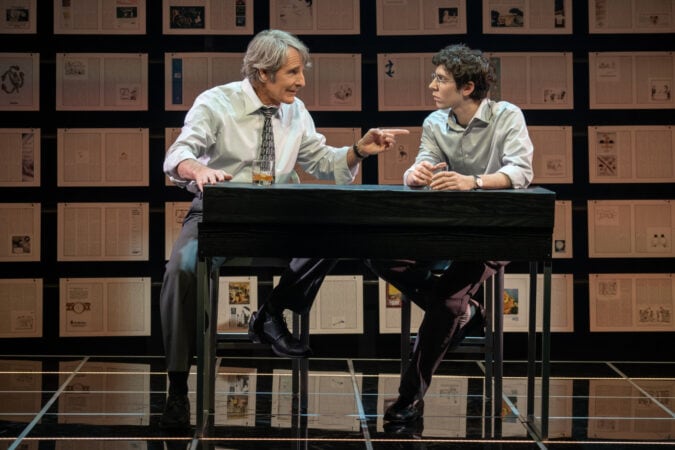
Directed by Daisy Prince (daughter of Broadway legend Hal Prince, who worked with Brown on Songs for a New World and The Last Five Years and conceived the idea for the current musical), the story is set in NYC in the years 1995-97, and follows the rise and fall of the fictional Ethan Dobson, a talented and driven Princeton grad and new writer at the titular publication, taken on as a professional protégé and happy hour buddy by the magazine’s editor-in chief Conrad O’Brien, who sees the qualities of his own younger self in Dobson’s ambition and skill, and then skyrocketing sales of the issues that include pieces written by him.
But Robin Martinez, the show’s narrator, The Connector’s assistant copy editor and aspiring journalist, and Ethan’s colleague and social plus-one – who, as a woman, has been largely overlooked for job advancement and her submissions rejected for publication by the old-boys’ network – has increasing concerns about his untraceable anonymous sources and credibility, as discovered and exposed by the ethically resolute fact-checker Muriel and noted by the letter-writing reader Mona Bland, whose many even-handed and accurate correspondences to the magazine about his factual errors have gone unanswered.
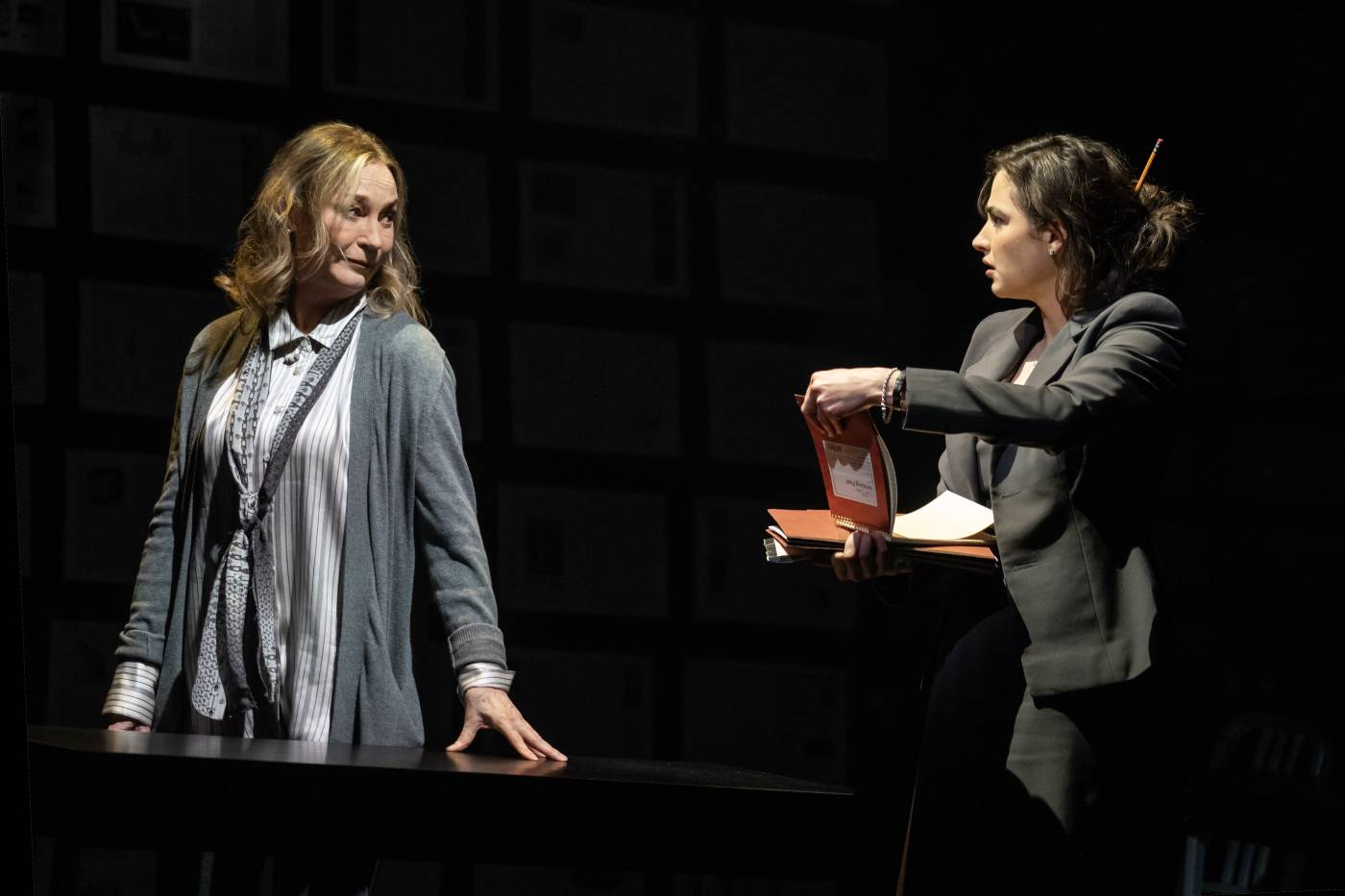
Among the other significant characters are Waldo Pine, a colorful “Scrabble shark” in Greenwich Village, and Willis Taylor, who videotaped a teenager smoking crack with the Mayor of Jersey City – both subjects of falsified stories that come to life in Ethan’s accounts and the theatrical full-company production numbers led by them (and – spoiler alert – who happen to bear a striking resemblance to his co-worker Bob and his own brother Billy, in a telling use of double casting). And there’s Zachary, The Connector’s legal counsel, who is brought in to consider the potential liability of the magazine for printing such defamatory and unverifiable articles, which, he advises, can be avoided simply by using quotation marks when citing unnamed informants (until it can’t). It all makes for a fascinating and timely morality tale in which increased circulation and profits trump journalistic standards and objective reporting.
The cast and staging, music and writing are sensational (in the best sense of the word), delivering the message and the plot points of the engrossing story with powerful voices, expressive movement (choreography by Karla Puno Garcia), and distinctive characterizations. Ben Levi Ross as Ethan Dobson hits the perfect combination of narcissist, nerd, manipulative schmoozer, and pathological liar, with moments of recognition and anxiety over what he’s done, and blockbuster vocals that convey it all. In the role of Conrad, Scott Bakula makes an impressive return to the stage, capturing the favoritism and misogyny that enable Ethan, trivialize the discerning women (one visually potent scene has him striking an extended frozen pose at an event when Robin tries to talk to him, then exuberantly interacting with Ethan when she walks away and he approaches), and have a serious impact on the 50-year-old publication.
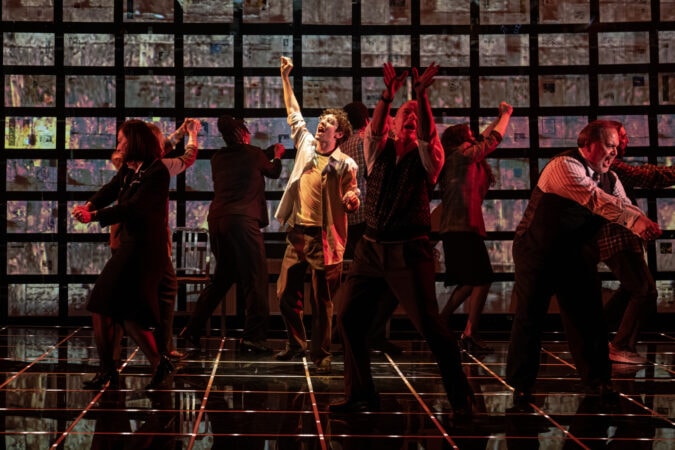
Hannah Cruz as Robin takes charge of the story, with direct-address narration, and of her own career, with increasing anger over her dead-end position at The Connector and growing realization of what’s going on with Ethan (please note that Cruz’s final performance as Robin will be on Sunday, March 3, and Ashley Pérez Flanagan will assume the role beginning on Tuesday, March 5). Her consternation comes to a head while she’s out drinking with him, when she receives an offer from Nestor Fineman (well-played by Eliseo Román), the editor of a competing publication who commends her writing, and with the decision she ultimately makes about journalistic integrity, supported by her new boss, the no-nonsense Muriel (the excellent Jessica Molaskey), and Mona (Mylinda Hull, adding some comic relief and purposeful observations to the burgeoning questions about Dobson, while singing the contents of her letters).
Also contributing to the humor and high energy of the musical are Max Crumm in the dual roles of Waldo Pine and Billy Dobson, and Fergie Philippe as both Willis Taylor and Bob Henshaw, each readily distinguishing between the personalities and demeanors of their two characters, and both enacting the imaginative articles created by Ethan and taking the lead on two of the show’s liveliest songs (Waldo’s “Success” and Willis’s “Wind in My Sails”), indicative of the apropos array of musical genres in Brown’s superb character-defining, background-revealing, and plot-advancing score (with music direction by Tom Murray). That’s precisely what original compositions should do in a work of musical theater (and what should garner Brown multiple awards again this season).
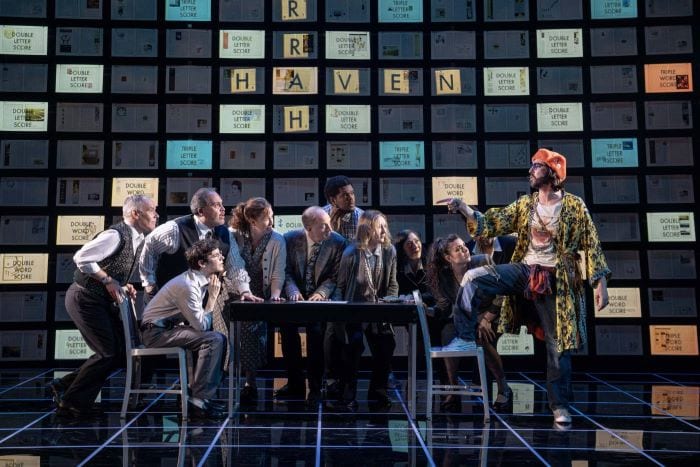
Rounding out the fine ensemble of triple threats are Flanagan, Danielle Lee Greaves, Daniel Jenkins, Ann Sanders, and Michael Winther, accompanied by a top-notch six-piece orchestra (Brown on piano, associate conductor Adam Kaufman on keyboard, Randy Landau on bass, Jamie Eblen on drums, Hidayat Honari on guitars, and Todd Reynolds on violin – featured in the traditional Jewish-style song “The Western Wall”).
An equally masterful artistic design supports the stellar performances. Costumes by Márion Talán de la Rosa are largely in understated shades of black, white, and grey for the business attire of the staff, in contrast with the bright hues worn by the colorful street characters of Waldo and Willis. Beowulf Boritt’s set, aurally enhanced by Jon Weston’s sound and electronic music by Billy Jay Stein and Hiro Iida/Strange Cranium, employs the format of a grid, with a glossy black floor, modern desks and office chairs, stacked boxes of magazines at both sides of the stage, and a back wall with floor-to-ceiling rows of headline pages, with focused spotlights, blackouts, actively running lighting, and changing projections by Jeanette Oi-Suk Yew that identify the times of day, the workplace and after-work locales, the shifting moods, and the details of Dobson’s stories (including the tiles of a Scrabble board and the Wailing Wall of Jerusalem), with a fitting surprise at the show’s conclusion.
The Connector tackles a subject that should be of interest to all of us who long for unbiased coverage and confirmed truth in journalism, especially in this opinionated age of unedited social media and AI, and a divisive presidential election year. I highly recommend that you go see this resonant production to be both warned and entertained.
Running Time: Approximately one hour and 45 minutes, without intermission.
The Connector plays through Sunday, March 17, 2024, at MCC Theater, 511 West 52nd Street, NYC. For tickets (priced at $74-139, plus fees), go online.


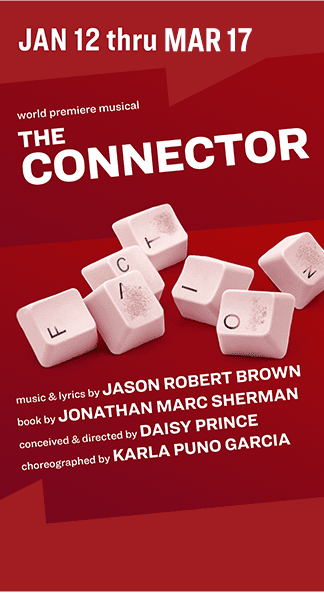
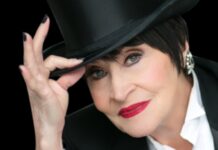


Wow. A musical about journalism and honesty. I hope this comes to DC soon!